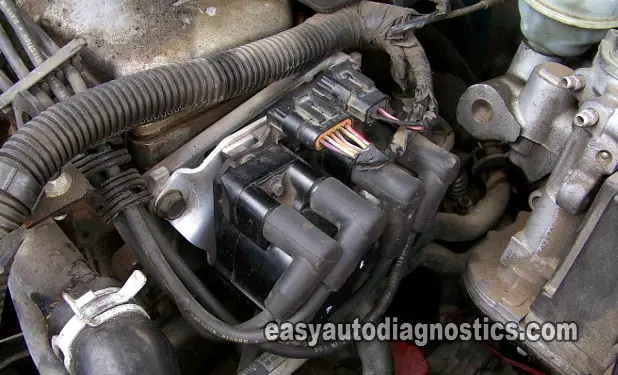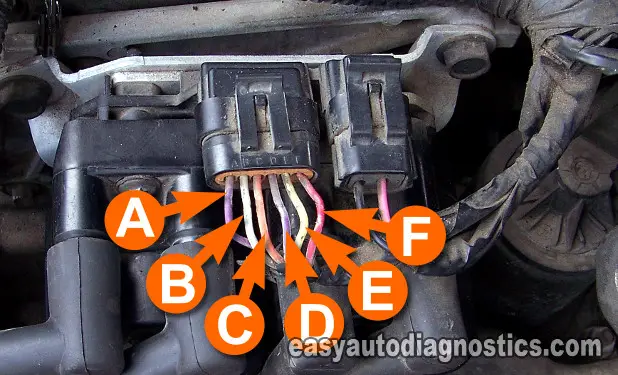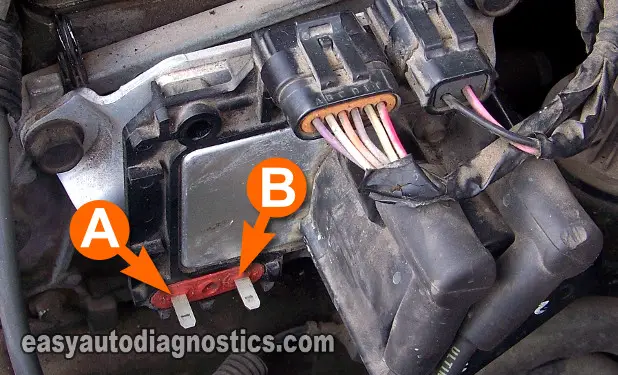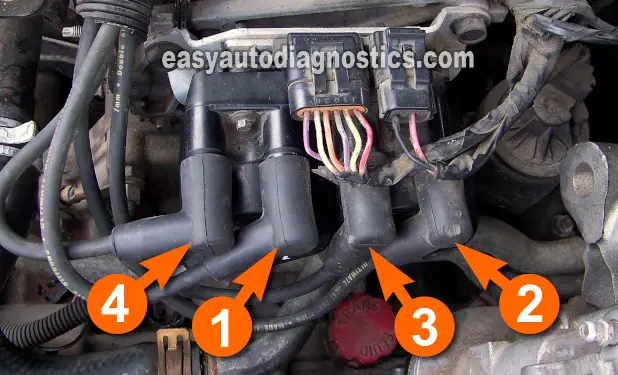
This tutorial will show you how to test the ignition coil packs on the 2.2L 4 cylinder GM engines used in the Chevrolet Cavalier and Pontiac Sunfire cars.
You'll easily and quickly test the ignition coil packs and the ignition control module (ICM) without a scan tool.
So, whether your Cavalier or Sunfire has a misfire condition or a no-start no-spark condition, this tutorial will help you troubleshoot and diagnose the problem.
Now, in case your Cavalier or Sunfire does not start and you need to test the crankshaft position (CKP) sensor, you can find the CKP sensor test here:
To see all of the GM 2.2L ‘How To Test’ tutorials, go here: GM 2.2L Main Index Of Articles.
In case this article doesn't help you, another great source of testing info is the series of articles (4 in total) on troubleshooting misfire codes at troubleshootmyvehicle.com, here's the specific article:
- How To Diagnose Misfire Codes (GM 2.2L) (at: troubleshootmyvehicle.com).
Contents of this tutorial:
- Symptoms Of A Bad Ignition Coil And A Bad Ignition Control Module (ICM).
- What Tools Do I Need?
- Ignition Coil Circuit Descriptions.
- 6 Wire Ignition Module Connector Circuit Descriptions.
- Ignition Coil Test Application Chart.
- TEST 1: Spark Test.
- TEST 2: Spark Test Directly On Coil Tower.
- TEST 3: Ignition Coil Power Circuit Test.
- TEST 4: Ignition Coil Switching Signal Circuit.
- TEST 5: Ignition Module's Triggering Signal.
- Other Causes Of Misfires.
![]() You can find this tutorial in Spanish here: Cómo Probar La Bobina De Encendido GM 2.2L Cavalier, Sunfire (at: autotecnico-online.com).
You can find this tutorial in Spanish here: Cómo Probar La Bobina De Encendido GM 2.2L Cavalier, Sunfire (at: autotecnico-online.com).
APPLIES TO: This tutorial applies to the following vehicles:
- 2.2L Chevrolet Cavalier: 1997, 1998, 1999, 2000, 2001, 2002.
- 2.2L Pontiac Sunfire: 1997, 1998, 1999, 2000, 2001, 2002
NOTE: The information in this tutorial will also apply to the 1997-2003 2.2L Chevy S10 Pickup and 1997-2003 2.2L GMC Sonoma, although the ignition coil/ICM assembly is in a different location.
Symptoms Of A Bad Ignition Coil And A Bad Ignition Control Module (ICM)
When an ignition coil pack or the ignition control module goes bad, on your 2.2L Chevy Cavalier or Pontiac Sunfire, the car will suffer a misfire condition or a 'no-spark no-start' condition. Here's a short list of symptoms:
- Check engine light (CEL) on.
- Misfire codes:
- P0300: Random Cylinder Misfire.
- P0301: Cylinder #1 Misfire.
- P0302: Cylinder #2 Misfire.
- P0303: Cylinder #3 Misfire.
- P0304: Cylinder #4 Misfire.
- Misfire condition without any misfire codes lighting up the check engine light (also known as the Malfunction Indicator Light: MIL).
What Tools Do I Need?
No expensive tools are required to test this type of ignition system. Now, having said that, there some very specific tools I recommend to use for the tests. So, here's the basic list:
- A spark tester
- Not just any type of spark tester. I strongly suggest you buy the HEI spark tester (don't have an HEI spark tester? Need to buy one? You can buy it here: OTC 6589 Electronic Ignition Spark Tester).
- Don't use a regular spark plug instead of a dedicated spark tester.
- Don't pull the spark plug wire off of the spark plug as the engine is cranking or running. This will give a false result and/or damage the ignition coil.
- An LED light.
- Click here to see what this looks like: The LED Light Test Tool And How To Make One
- Test light.
- Multimeter.
- A cheapie one will do (don't have a digital multimeter? Need to buy one? Click here to see my recommendations: Buying A Digital Multimeter For Automotive Diagnostic Testing).
- Repair manual.
- For whatever other information this article does not cover.
- Helper.
- To help you crank the engine while you observe the LED light (or test light or multimeter).
As mentioned at the beginning of this article, you don't need an automotive scan tool for any of these tests.
Ignition Coil Circuit Descriptions
Each ignition coil is fed power, in the form of 10 to 12 Volts, and a switching signal. These two signals are provided by the ignition control module (ICM). Now to test these two circuits, the ignition coil pack has to be removed and using the photos supplied in each test step, I'll show how to test these Signals.
Also, you'll need to know which ignition coil pack feeds what two cylinders with spark. Photo number 2 in the image viewer above will help with this, since the numbers in the arrows identify the cylinder each spark plug wire supplies spark to.
- Circuit labeled A:
- Power (12 V) Circuit.
- Circuit labeled B:
- Switching Signal Circuit.
Although in the photos I'm using in the test steps you'll see the ignition coil pack that feeds cylinders #1 and #4 removed (and exposing the ICM's male spade terminals that feed it the signals), the other ignition coil pack's circuit descriptions are the exact same. This photo and related info will help you diagnose/troubleshoot the coil pack feeding cylinders #2 and #3 with spark.
6 Wire Ignition Module Connector Circuit Descriptions

Although the main focus of this article is testing the ignition coil packs on your Chevy Cavalier or Pontiac Sunfire, you'll also test some of the ignition control module's circuits.
To this end, below you'll find the circuit descriptions of all of the wires in the both connectors:
- 6 Wire ICM Connector:
- A- PURPLE wire.
- Crankshaft position sensor circuit.
- B- WHITE wire.
- 1-4 Ignition Coil Control Signal (comes from the ECM). The service literature will call this the Ignition Control Signal A.
- C- ORANGE wire.
- 2-3 Ignition Coil Control Signal (comes from the ECM). The service literature will call this the Ignition Control Signal B.
- D- PURPLE with WHITE stripe wire.
- 7X Reference Signal (goes to the ECM).
- E- YELLOW wire.
- Crankshaft position sensor circuit.
- F- RED with BLACK stripe wire.
- Ground circuit for ECM.
- A- PURPLE wire.
- 2 Wire ICM Connector:
- A- BLACK (or BLACK with WHITE stripe) wire.
- Engine Ground (for the Module).
- B- PINK wire.
- 12 Volts with Ignition ON.
- A- BLACK (or BLACK with WHITE stripe) wire.
Boy, there sure are a bunch of wires! But don't worry, you don't need to test them all to find out if the ignition coils or the ignition control module is bad. OK, let's get started with TEST 1.
Ignition Coil Test Application Chart
- Cavalier 2.2L 4 cyl.
- 1997, 1998, 1999, 2000, 2002
- Sunfire 2.2L 4cyl.
- 1997, 1998, 1999, 2000, 2002


